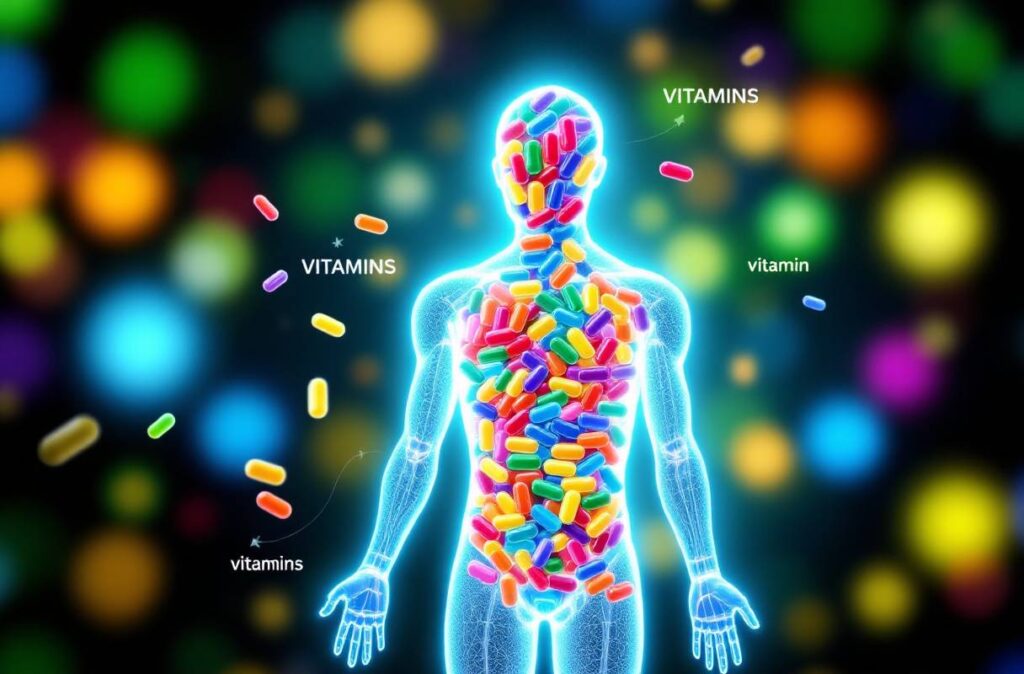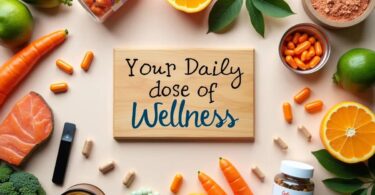Ever feel like you’re navigating a maze when it comes to vitamin supplements?
You’re not alone! In the world of health and wellness, myths about these little pills seem to multiply faster than you can say “multivitamins.” But fear not, health-savvy friend!
We’re about to embark on a myth-busting journey that’ll clear the fog and help you make informed choices about your supplement routine. From safety concerns to effectiveness claims, we’re diving deep into the world of vitamin supplements to separate fact from fiction. Ready to become a supplement sage? Let’s open up on these common misconceptions and get to the truth!
Sorting Out Vitamin Supplement Myths
Hey, health enthusiast! It’s time to get the facts straight about vitamin supplements. Misinformation can throw you off track, steering you toward bad choices. Let’s shed some light on the most common myths.
Myth: Supplements Are Always Safe
Just because you can snag them at your local store doesn’t mean they’re risk-free. Some can clash with your meds, some can have you feeling queasy, and too many can even be toxic—ouch. Chatting with your doc before popping any new pills is a smart move.
| Potential Risks of Supplements | Impact |
|---|---|
| Clash with Meds | Might mess with how well they work |
| Toxic Overload | Too much can be trouble |
| Allergy Alerts | Could spark serious reactions |
Myth: All Supplements Are Created Equal
Not all of these little pills are made the same. Some brands might cut corners with quality or strength. Go for those that have someone else check their work and got the good reviews. Trustworthy supplements usually play nice with your body. Want tips? Peek at our guide on picking supplements.
| Quality Indicators | Description |
|---|---|
| Independent Tests | Shows they’re safe and work |
| Top-Notch Practices | Means better craft from start to finish |
| Honest Labels | Where you see what’s really inside |
Myth: You Don’t Need Supplements If You Eat Well
Sure, eating right is big. But, depending on things like your age or lifestyle, you might be missing some nutrients. That’s when supplements can step in. Check what you’re munching on and see if supplements fit in. Curious about choices? Check out our overview of vitamin supplements.
| Nutrient Needs | Reasons for Supplementation |
|---|---|
| Vitamin D | Sun’s not always shining |
| Iron | Good luck if you’re on the veggie train |
| B Vitamins | For the gym rats and active bees |
Myth: Vitamins Can Replace Medications
While they’re great for patching up nutrient holes, vitamins aren’t stand-ins for your prescribed drugs. They can boost health and fend off gaps, but they’re not healers. Stick to the meds your doc gives you and consider supplements just another piece of the puzzle. For more diets on how vitamins help out, see our look at vitamin benefits.
| Vitamins vs. Medications | What They Do |
|---|---|
| Vitamins | Keep holes from appearing, aid in feeling good |
| Medications | Target and treat health things |
Get clear on these vitamin myths, and you’ll be making smart picks for your health journey. Knowing what’s what leads you to better health and a game plan that hits all the right spots.
Understanding Vitamin Supplements
Vitamin supplements aren’t just fancy pills. They’re like your health’s backstage crew, ready to fill in where your diet might be slacking. Get clued up on what they’re all about so you can keep your body thriving.
The Role of Vitamin Supplements
Vitamin supplements step in when your meals aren’t quite hitting the mark. Maybe you’ve got particular health stuff going on, or you’re avoiding certain foods, or maybe life’s just got you running on empty faster than usual. Think you’re pregnant, getting older, or eating vegan. It can be tricky matching up to your vitamin and mineral goals under these circumstances. Enter, supplements—they’re your ticket to keeping things in balance when you can’t rely on food alone.
Sure, food is where it’s at for nutrients, but sometimes, popping a supplement is the best shortcut to keeping your health on track. They’re like a safety net for catching what your plate missed, making sure you’re not running low on essential bits that keep you ticking over smoothly.
“Supplements can be useful, but they are not a substitute for a good diet. They can plug nutritional gaps, but it is important to understand that nutritional needs should be met primarily through food.”
Dr. JoAnn Manson, Professor of Medicine at Harvard Medical School
Types of Vitamin Supplements
There’s a bunch of different vitamin supplements out there, each with its own focus. Let’s break ’em down:
| Supplement Type | Description |
|---|---|
| Multivitamins | These guys mix up vitamins and minerals to cover the basics. Peek at our daily multivitamin benefits for more. |
| Vitamin D Supplements | Have trouble catching rays? These help keep your bones and immunity in check. Find out more in vitamin D supplements. |
| B Complex Supplements | For energy and brain vibes, you need a mix of B vitamins. Check out what they do in vitamin B complex supplements. |
| Gummy Vitamins | If swallowing pills isn’t your thing, these chewy ones might be, but effectiveness varies. Check the scoop in gummy vitamin effectiveness. |
| Antioxidant Supplements | Fight off oxidative stress with vitamins like E and C. See what they’re about in antioxidant vitamin supplements. |
| Natural vs. Synthetic | Supplements come in both these flavors—head over to natural vs synthetic vitamins to weigh them up. |
Knowing your vitamin supplements can really help you pick out what suits your goals best. Make sure you’re checking out the quality and how much you’re taking—it matters big time in the supplement game. Learn more about picking the right ones at choosing vitamin supplements. Remember, you’re the captain of your own health mission, so if you’re unsure, ask the pros.
Factors Shaping How Well Supplements Work
Not all vitamin supplements hit the same note when it comes to effectiveness. A bunch of factors come into play here, and getting in the know can guide you in picking what’s right for you.
What You Really Need
Your personal nutrient lineup is key. Your age, gender, lifestyle, and how your health’s doing will decide the vitamins you actually need. Like, if you’re expecting, you’ll probably need more of some vitamins compared to others. Similarly, an athlete’s nutritional needs will differ due to their training demands.
| Age Range | Daily Vitamin D Goal |
|---|---|
| Kids (1-18) | 600 IU |
| Adults (19-70) | 600 IU |
| Seniors (above 71) | 800 IU |
| Pregnant Ladies | 600 IU |
Want to dive deeper? Check out our piece on vitamin D supplements.
Are You Getting What You Pay For?
Not all supplements are wearing the same jersey. Some might be hiding extra stuff that’s not doing much for you, while others might lack the right form or amount of vitamins. Go for high-quality products that deliver what they promise. Scanning vitamin supplement labels can clue you in on what’s really in a bottle.
| Things to Consider | Why They Matter |
|---|---|
| Checked by third-parties | Confirms they’re up to par and safe |
| Brand’s track record | Tells if they’re trustworthy |
| Where ingredients come from | Impacts how well they work |
Need tips on picking the best? Visit our article on choosing vitamin supplements.
How Your Body Takes It In
How your body absorbs and uses vitamins is a game-changer. ‘Absorption’ and ‘bioavailability’ are about how well your body can make use of these nutrients. Some types of vitamins get absorbed better than others.
| Type of Vitamin | How Well It’s Absorbed |
|---|---|
| Natural | Gets a boost due to other beneficial compounds |
| Synthetic | Might not absorb as efficiently |
For a closer look at this, check out our discussion on natural vs synthetic vitamins.
Several factors like having food in your belly, the type of supplement (think gummies), and mixing with other vitamins can change how much your body absorbs. For more on gummies and their work rate, take a look at gummy vitamin effectiveness.
Addressing Specific Misconceptions
Let’s bust some myths about those vitamin supplements. Getting the facts straight will help you make the best choices for your well-being.
Myth: Supplements Can Cure All Ailments
There’s a tall tale floating around that vitamin supplements can fix everything that ails you. Sure, they might boost your health a bit, but popping a pill isn’t a magic cure for things like heart disease, diabetes, or cancer. Those serious issues should have a pro on the case. Depending solely on supplements could mean you’re skipping the treatment you really need. Curious about picking the right supplements? Check out our full scoop on choosing vitamin supplements.
Myth: More is Better
Loads of folks think the more vitamins they take, the healthier they’ll get. Nope, not quite. Guzzling down too many vitamins can actually be harmful, especially the fat-soluble ones like A, D, E, and K which love to hang out in your body. Stick to what’s suggested daily; more doesn’t always = better.
Here’s the skinny on some popular vitamins and their safety limits:
| Vitamin | Recommended Daily Allowance (RDA) | Tolerable Upper Intake Level (UL) |
|---|---|---|
| Vitamin A | 700 mcg | 3,000 mcg |
| Vitamin D | 600 IU | 4,000 IU |
| Vitamin C | 90 mg | 2,000 mg |
| Vitamin E | 15 mg | 1,000 mg |
Want to dive into the downsides of overdosing? Peek at our piece about vitamin supplement side effects.
Myth: Natural Vitamins Are Superior
A lot of folks swear by natural vitamins, thinking they trump the synthetic ones. While it’s true your body may absorb some natural vitamins better, when taken correctly, the synthetic ones can pack just as much punch. Rather than getting hung up on whether they’re natural or not, focusing on the source’s quality is what really matters. Need more info? Look at our breakdown on natural vs synthetic vitamins.
By setting the record straight on these myths, you’ll be better equipped to make wise choices about vitamin supplements and keep yourself in tip-top shape.
Making Smart Choices

Picking the right vitamins for you might sound straightforward, but it really pays to get clued up first. Understanding the basics of vitamin supplements will steer you towards what’s best for your needs.
“The key is to keep things in perspective. If you don’t eat a nutritious variety of foods, some supplements might help you get adequate amounts of essential nutrients. But supplements can’t take the place of the variety of foods that are important to a healthy diet.”
Dr. Donald Hansard, Director of the Mayo Clinic Healthy Living Program
Chat with the Pros
Before jamming those vitamins into your routine, why not have a quick chat with a healthcare pro? They can check out your health scene, spot any nutrient gaps, and pinpoint the supplements that fit your vibe and lifestyle. It’s their job to make sure you dodge any unwanted effects from taking too much or the wrong stuff.
| Healthcare Helper | What They Do |
|---|---|
| Nutritional Guru | Gives you tailored nutrition advice |
| Doc | Looks you over and gives medical pointers |
| Diet Whisperer | Helps with special dietary needs |
Keep it Real with Your Diet
Don’t toss the apples and carrots just yet. Popping pills isn’t the same as munching on real food, with all those natural goodies like fiber and antioxidants that shop-bought pills can’t match. Loading up on colorful fruits, veggies, grains, proteins, and good fats is key for feeling fresh and health-strong.
It’s smart to sketch out a weekly meal plan packed with those vitamin-rich foods. Need ideas on what to include? Catch our piece on choosing vitamin supplements.
| Grub Group | Vital Vitamins/Minerals |
|---|---|
| Fruits | Vitamin C, Folate |
| Veggies | Vitamin A, K, Potassium |
| Grains | B Vitamins, Iron |
| Proteins | Zinc, Vitamin B12 |
| Good Fats | Vitamin E, Omega-3 |
Track Your Vitamin Game
Keeping an eye on what vitamins you’re taking helps you hit your nutrition goals without going overboard. Jot them down in a notebook or log them in a mobile app—whatever helps you remember.
Being aware of your consumption lets you spot changes in how you feel, which comes in handy when you’re meeting up with your healthcare friend. Check out what’s on vitamin supplement labels to make sense of dosage and what’s packed into each bottle.
| Supplement | How Much Daily? |
|---|---|
| Vitamin D | 600 IU (15 mcg) |
| Vitamin B12 | 2.4 mcg |
| Folate | 400 mcg |
| Vitamin C | 90 mg |
Following these steps puts you in the driver’s seat for making wise vitamin choices. Stick to a balanced diet and lean on the pros when needed, and you’ll be rocking the good health vibes in no time.
Conclusion
There you have it, vitamin voyager! We’ve peeled back the layers of myth surrounding those colorful capsules and gummies.
Remember, supplements aren’t a magic bullet, but they’re not snake oil either. They’re tools in your health toolkit, best used with knowledge and care. From understanding that “natural” doesn’t always mean superior to recognizing that more isn’t always merrier, you’re now armed with the facts to make smarter supplement choices.
Don’t forget the power of a balanced diet, the importance of quality over quantity, and the wisdom of seeking professional advice. By busting these myths, you’re not just popping pills – you’re taking charge of your health journey. So go forth, make informed decisions, and let your newfound supplement savvy guide you to a healthier, happier you!
Additional resources
National Institutes of Health (NIH) Office of Dietary Supplements:
https://ods.od.nih.gov/
Mayo Clinic – Supplements: Nutrition in a pill?:
https://www.mayoclinic.org/healthy-lifestyle/nutrition-and-healthy-eating/in-depth/supplements/art-20044894
FAQs
1: Are vitamin supplements necessary for everyone?
Not necessarily. A balanced diet can provide most people with essential nutrients. However, certain groups like pregnant women, older adults, or those with specific health conditions may benefit from supplements.
2: Can I overdose on vitamins?
Yes, especially with fat-soluble vitamins (A, D, E, K). Always follow recommended dosages and consult a healthcare professional before starting any supplement regimen.
3: Are natural vitamins better than synthetic ones?
Not always. While some natural vitamins may be better absorbed, high-quality synthetic vitamins can be just as effective. The overall quality and formulation of the supplement matter more than its source.
4: Can vitamin supplements replace a healthy diet?
No, supplements should not replace a balanced diet. Whole foods provide additional benefits like fiber and phytonutrients that aren’t found in most supplements.
5: How do I choose a high-quality vitamin supplement?
Look for supplements that have been third-party tested, have clear labeling, and come from reputable manufacturers. Consult with a healthcare professional for personalized recommendations.



